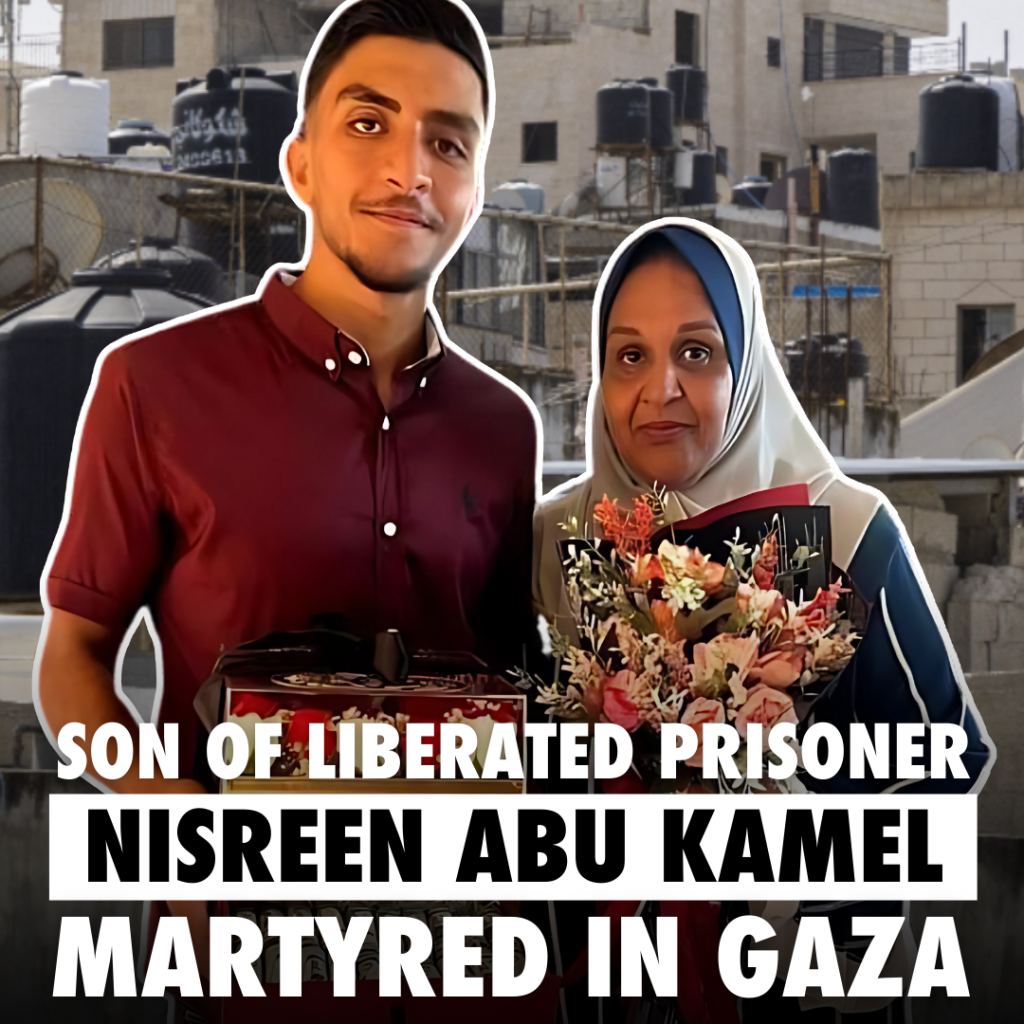
The following report is republished from the Dismantle Damon: Free the ReSisters campaign. Follow Dismantle Damon on Telegram and Instagram.
Fares Hazem Abu Kamel, 23, the son of liberated Palestinian prisoner Nisreen Abu Kamel, was martyred in Gaza on 17 October 2024, when ”israeli” warplanes targeted a house belonging to the Al-Halou family in the Tal Al-Hawa neighborhood in Gaza as part of its genocidal bombing campaign. After Nisreen and her children were separated for six years, only reunified in 2021, Fares’s life was taken, alongside those of tens of thousands of Palestinians, by the genocidal Zionist assault on Gaza.
Nisreen Abu Kamel, married to her husband Hazem Abu Kamel and the mother of seven children, was abducted by the occupation on 15 October 2015. She was abducted from the “Erez” crossing after she had traveled to Haifa — where she was born — to visit her family. At the time of her arrest, her youngest son was only 8 months old and her older daughter just 11 years old.
The Zionist regime accused Nisreen of “espionage,” with the occupation intelligence claiming that she had filmed the Haifa port in order to gather information for the resistance. She was sentenced to 6 years in prison.
Hazem, her husband, said that he and his sons set a “calendar” for Nisreen’s last 100 days in prison, and every morning they marked off what had passed. “They were slow days, but they passed with all their bitterness, and now we are waiting for Nisreen to reunite us”.
During her six years in Zionist jails, Nisreen and her family were consistently denied visitation, like many Palestinian prisoners from Gaza. After her 2021 release, Nisreen was originally denied access to Gaza for multiple days, even as her husband, children and loved ones awaited her. Image 5 above depicts the moment her daughters saw their mother for the first time in 6 years.
Nisreen and Hazem lived in Gaza for the entire 20 years of their marriage until her arrest. When the occupation initially refused to allow her to return to her family, Nisreen said: “I have been married in Gaza for 20 years, and I have the right to go back to my home and be reunited with my husband and children… I waited for the days and counted the hours until I returned to them.”
Nisreen affirmed her complete rejection of the occupation’s decision, declaring that she would sit in front of the Beit Hanoun “Erez” crossing, which leads to the Gaza Strip, until she would be allowed to return to her family.
The next day, Nisreen returned to Haifa, where she was greeted by activists of the “Haifa Movement” and Tala’at, a women’s movement. They all sang Palestinian national songs and chanted “Nisreen, we are with you… Freedom is yours.”
Nisreen’s return to her family and loved ones in Gaza was joyous and celebrated as a victory for the Palestinian people. She said: “I say to the occupation, I entered Gaza in spite of you and broke your power, and I salute the resistance that stood with the prisoners at all times.”
Upon her release, Nisreen carried a message from the Palestinian women prisoners, urging support for them against the mechanisms of “israeli“ persecution they face on a daily basis. She urged that the women prisoners be included in any future prisoner exchange with the resistance, calling for an escalation of the popular struggle to support them. During her time in prison, 3 women prisoners, Mona Qa’adan, Shatila Abu Ayad and Amal Abu Kattah started a hunger strike in protest of the deliberate medical negligence practiced routinely against the prisoners, which also affected Nisreen.
Our deepest condolences to Nisreen and Hazem Abu Kamel, their family, and the Palestinian people, on the martyrdom of their beloved Fares.









Discover more from Samidoun: Palestinian Prisoner Solidarity Network
Subscribe to get the latest posts sent to your email.




